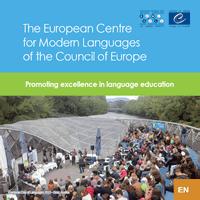Information about the ECML
 ECML information brochure: English - French
ECML information brochure: English - French
Compendium on cultural policies and trends in Europe
Initiated by the Council of Europe and the European Institute for Comparative Cultural Research (ERICarts) the Compendium is a web-based and permanently updated information and monitoring system of national cultural policies in Europe. Information is provided for 42 countries – Quick Facts, Cultural Policy Profiles, Compendium Grid in 26 national languages, Profiles of National Experts.
Transversal themes focus on Cultural access & participation, Cultural rights and ethics, Cultural diversity, Intercultural dialogue (including the Intercultural Cities Index), Status of artists, International cultural co-operation and mobility.
Two sections provide reports on national language issues and policies (section 4.2.5) and national language laws (section 5.1.9).
ECML results 2008-2011
Publication flyers in Swedish
Bernaus, Mercèdes et al., Plurilingualism and pluriculturalism in content based teaching – A training kit, 2011, project website
Boeckmann, Klaus-Börge et al., Promoting plurilingualism: Majority language in multilingual settings, 2011, project website
Candelier, Michel et al., CARAP – FREPA – A framework of reference for pluralistic approaches to languages and cultures, 2012, project website
Cortier, Claude, Cavalli, Marisa et al., Langues régionales/minoritaires dans l’éducation bi-/plurilingue – Langues d’ici, langues d’ailleurs, 2013, project website
Egli Cuenat, Mirjam et al., Mobility for plurilingual and intercultural education – Tools for language teachers and teacher trainers, 2011 (draft version), project website
Fischer, Johann et al., Guidelines for task-based university language testing, 2011, project website
Fitzpatrick, Anthony et al., E-VOLLUTION – Exploring cutting edge applications of networked technologies in vocationally oriented language learning, 2011, "E-VOLLUTION" project website, "VOLL" project website
Frigols, María Jesús et al., European framework for CLIL teacher education, 2011, project website
Haataja, Kim et al., Content and language integrated learning through languages other than English – Getting started!: Information brochure and online media platform on CLIL-LOTE, 2011, CLIL-LOTE-START project website, project website
Hasselgreen, Angela et al., Assessment of young learner literacy linked to the Common European Framework of Reference for Languages, 2011, project website
Krüger, Renate et al., Enseignement précoce des langues par des contenus disciplinaires – Une approche interculturelle, transdisciplinaire et basée sur l’autonomie de l’apprenant, 2011, project website
Lamb, Terry et al., Language associations and collaborative support, 2011, project website
Little, David George et al., The European Language Portfolio – A guide to the planning, implementation and evaluation of whole-school projects, 2011, project website
Muresan, Laura et al., QualiTraining – A training guide for quality assurance, 2007, project website
Newby, David et al., Using the European Portfolio for Student Teachers of Languages, 2011, project website
Nezbeda, Margarete et al., Using the European Portfolio for Student Teachers of Languages, project website
Noijons, José et al., Relating language examinations to the Common European Framework of Reference for Languages: learning, teaching, assessment (CEFR) – Highlights from the Manual, 2011, project website
Piccardo, Enrica, Berchoud, Marie et al., Pathways through assessing, learning and teaching in the CEFR, 2011, project website
Schlemminger, Gérald et al., Enseigner une discipline dans une autre langue – Méthodologie et pratiques professionnelles, 2011, project website
Stickler, Ursula et al., Developing online teaching skills – Bite-size training for language professionals, 2011, DOTS project website, MOODLE DOTS project website
Tardieu, Claire et al., Common European Framework of Reference for Languages - Level estimation grid for teachers, 2011, project website
Common European Framework of Reference for Languages
Swedish version: Gemensam europeisk referensram för språk: lärande, undervisning och bedömning, Skolverket, 2007, ISBN : 978-91-85545-50-6
European Language Portfolio
Other resources
Eurypedia – the European Encyclopedia on National Education Systems
Eurydice has launched Eurypedia – the European Encyclopedia on National Education Systems. This online resource presents the education system organisation and recent reforms in Europe. Eurypedia contains more than 5000 articles and covers 38 school and university systems within the 33 countries participating in the EU's Lifelong Learning Programme (all 27 EU Member States as well as Croatia, Iceland, Liechtenstein, Norway, Switzerland and Turkey). All Eurypedia content is available in English and, where applicable, in the language of the country, and is organised by topic and country.
• Information relating to Sweden
Euromosaic
Euromosaic study: Support from the European Commission for measures to promote and safeguard regional or minority languages and cultures.
National relay for the European Day of Languages (EDL)
The function of a national EDL Relay is to act as a multiplier for organisations, schools and associations, circulating:
-
information communicated by the Council of Europe (for example the press release of the Council on the Day, which the Relays are invited to translate into national/local languages, updates on the website);
-
promotional materials - posters, stickers etc. provided by the Council of Europe every year in significant quantities for event organisers.
Contact details
EDL website
Sweden and the Council of Europe in brief
Available in English - French - German - Italian - Russian